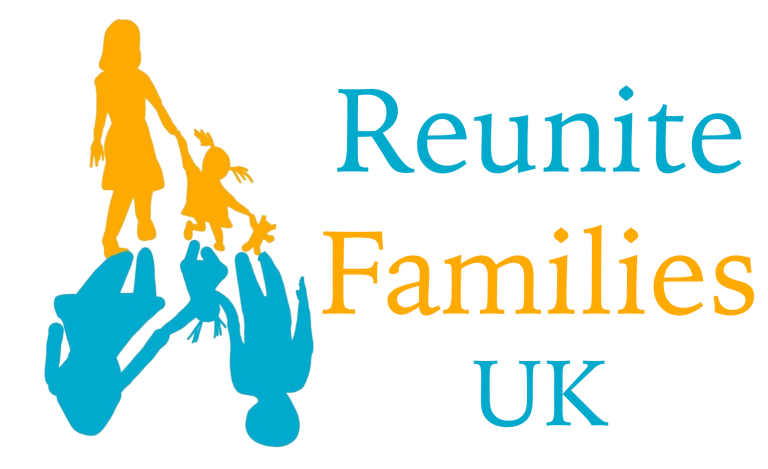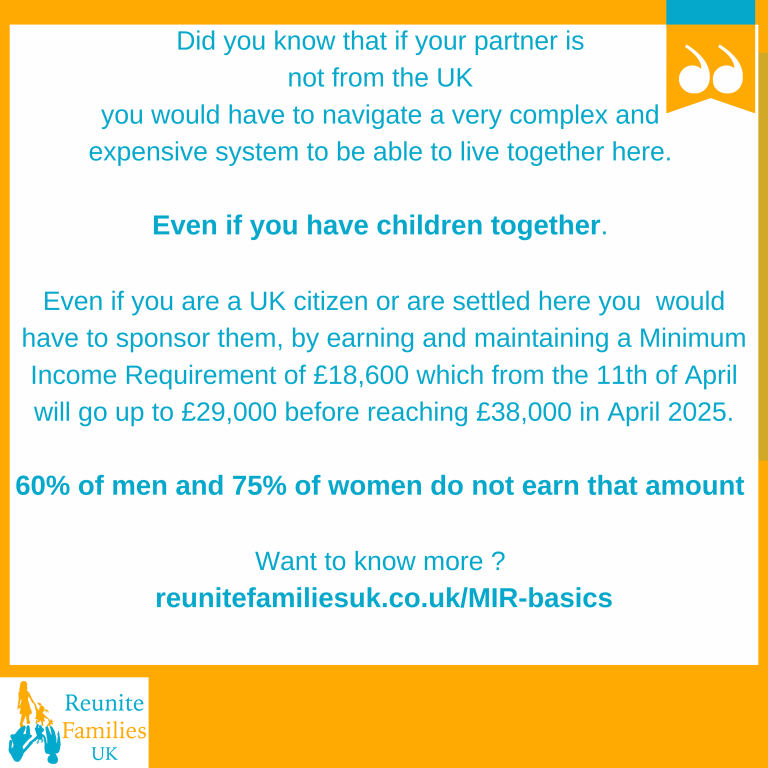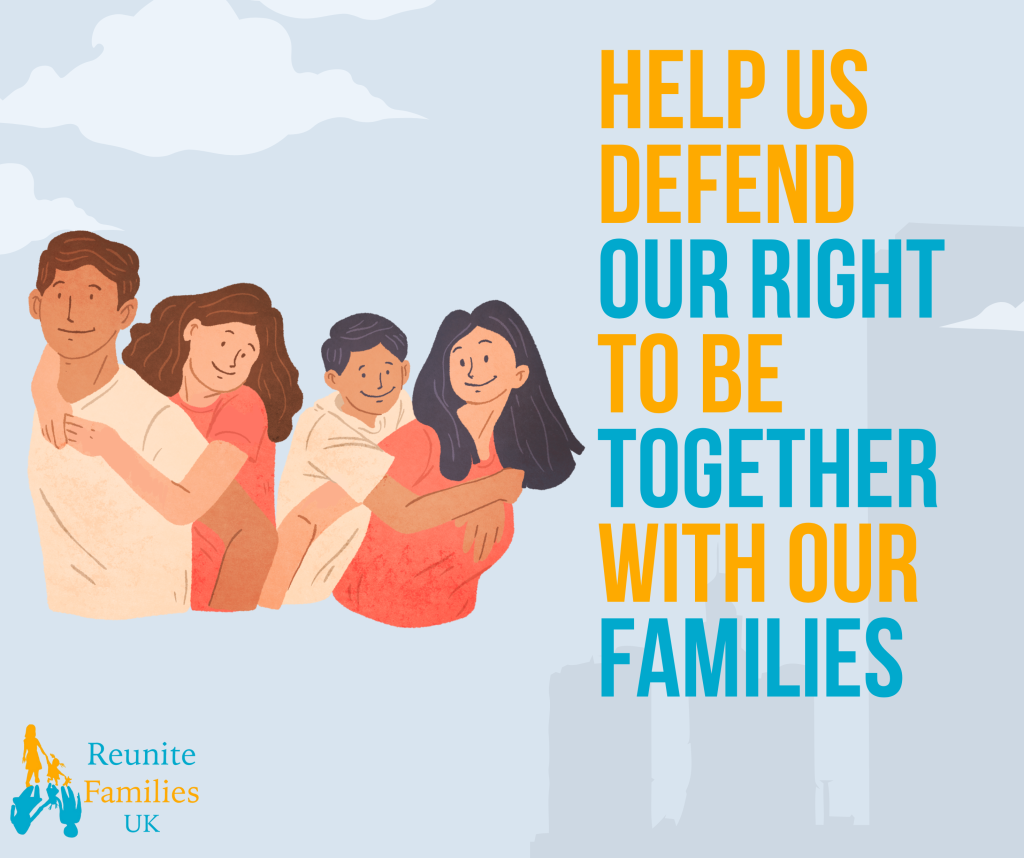MIR: what you need to know and what you can do about it
What is the MIR?
The MIR stands for Minimum Income Requirement: the financial threshold that British citizens and settled residents must meet in order to be able to sponsor a joining family member such as a partner, a child or an elderly parent. It is one of the most critical aspects of the application process as the applicant must demonstrate that they can be adequately maintained in the UK without recourse to public funds.
This threshold has been imposed on families since 2012 when, as part of the hostile environment, the government toughened the family migration policy and introduced a set of complex and restrictive rules.
On 11th April 2024 there were changes to the threshold and further changes are expected around Spring 2025, as detailed below.
These rules include several aspects to them, including other financial requirements and costs. This page will focus on the MIR.
Please note: the following page is accurate as of 11th April 2024, it does not constitute legal advice
How much is the MIR?
MIR for applications made before the 11th of April and further grants of leave to remain to applicants whose initial application was made before 11th of April 2024.
To sponsor a partner, without children:
- Currently the MIR is £18,600.
- To sponsor non-British children who are also applying for visas at the same time – the MIR will be increased by £3,800 for the first child, and then by a further £2,400 per child for any additional children.
MIR for new applications made from the 11th of April and further grants of leave to remain to applicants whose initial application was made after 11th of April 2024
- The MIR is £29,000
There won’t be any longer a separate child element for the applications made from the 11th of April.
Member of the Armed Forces
- The MIR will be £23,496
- There will be a separate child element
- The combined MIR + child element won’t be more than £29,000
Technical details
MIR must be demonstrated at each stage of the application: initial, extension and indefinite leave to remain.
Previously if someone is employed, they must demonstrate six months of earnings that would make up the equivalent to an annual salary of £18,600 (for first and subsequent applications made from the 11th of April it will now have to be £29,000)
The rules are different if you are self-employed, or if the earnings come from other sources than an employment salary i.e., cash savings, pension income, property investments or combinations of these.
Now, people must earn £29,000
You can read more about the technical details of the requirement on FreeMovement blog, including examples of what income counts, and how it must be demonstrated.
Other financial requirements - Adequate accommodation requirement
The applicant must demonstrate that there will be adequate accommodation without recourse to public funds, for the family, including family members which may not be included in the application itself (or even those readily living at the accommodation in the same household, which the family own or occupy exclusively.)
The accommodation must not be considered overcrowded and against public health regulations.
Costs associated with the Spouse and Partner migration rules
Costs associated with this visa can be found here – https://www.gov.uk/uk-family-visa.
Applicants should consider the following fees:
- Visa Fees (and visa extension fee)
- *Immigration Health Surcharge (per applicant and calculated on an annual basis)
- English Language test (exceptions may apply if the individual is from a majority English speaking country, or if they have a degree which was taught in English)
- Life in the UK test
- Tuberculosis test results (if applying from an overseas country where you are required to take the test)
- Certified translations (if any original documents are not in English)
*The Immigration Health Surcharge fees increased as of 06 February 2024. For adult applicants, the annual IHS fee has increased to GBP 1,035 per person per year and for child applicants (those under 18), the fee has increased to GBP 776 per person per year.
For your consideration, a breakdown of the costs associated with this type of visa are below and accurate as of March 2024. The precise figure to be paid would depend on who is joining and how you apply:
Fee | Applying from outside of the UK | Applying in the UK |
Visa application – per person | £1,846 | £1,048 |
**Immigration Health Surcharge | £1,035 per person per year (over 18)
| £1,035 per person per year (over 18) |
£776 per person per year (under 18) | £776 per person per year (under 18) | |
Expedited Processing Service (Faster government decision turnaround) | Subject to local jurisdiction availability
Priority service (5 working days) – approx. £500 per person
Super priority service (1 or 2 working days) – approx. £1,000 per person. | Super priority service – 1 or 2 working days
£1,000 per person
|
Biometric Appointment Fee | Subject to local jurisdiction availability
| Free appointments are available.
Paid appointments allow you to have an earlier appointment. These tends to be:
Around £128 – £180 per person |
**Immigration Health Surcharge
You might also need to pay the healthcare surcharge as part of the application.
For each adult (18 or older) it costs:
- £2,587.50 for 2 years and 6 months
- £3,105 for 2 years and 9 months
- £5,175 for 5 years
For each child (under 18), it costs:
- £1,940 for 2 years and 6 months
- £2,328 for 2 years and 9 months
- £3,880 for 5 years
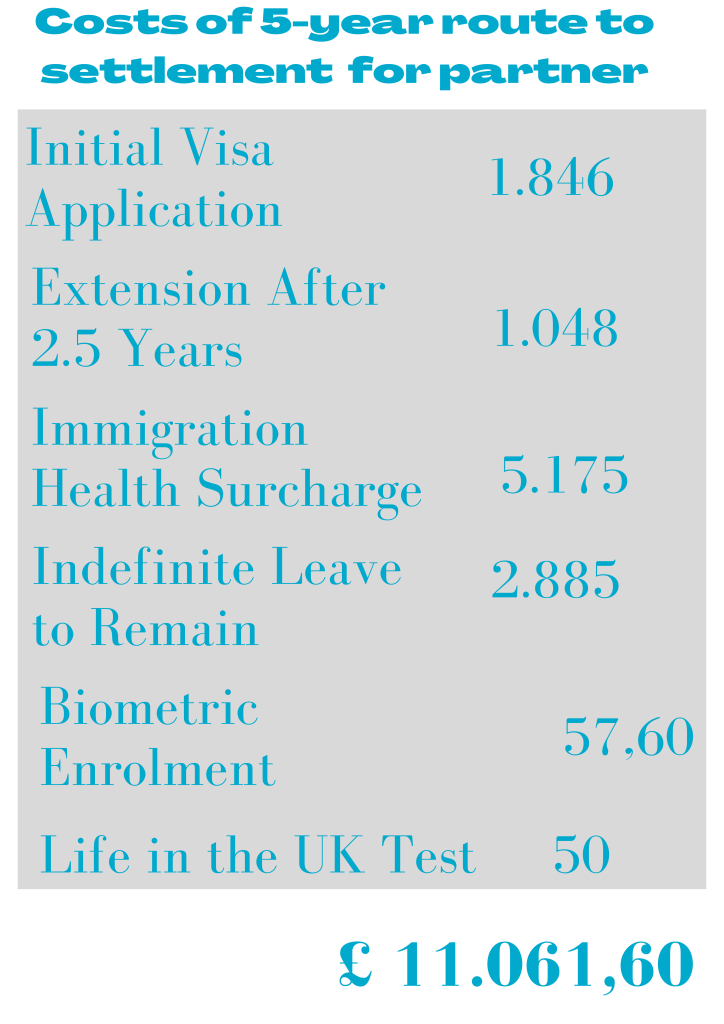
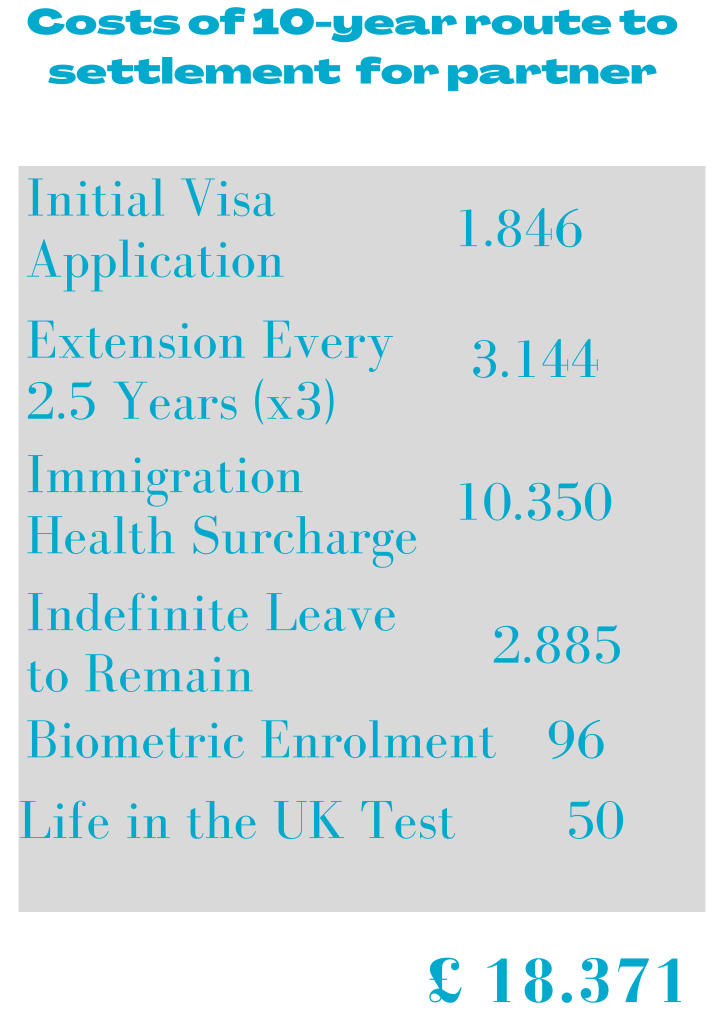
What happens if the sponsoring partners doesn’t earn the required amount?
If the person is unable to meet the required amount, their options include:
- A) Apply for ‘Exceptional Circumstances’ (see below)
- B) Remain overseas / move overseas to be with partner
- C) Stay in the UK but separated from partner
In options B or C, the sponsor and/or the applicant could wait and apply down the line if their earnings have increased to meet MIR.
With option C, people are sadly forced to be separated from their loved ones. If the couple has children, these children therefore also face separation from one of their parents .
How many people are impacted by this issue?
We don’t know, and it is difficult to calculate this statistic with the available data. In 2015, the Children’s Commissioner for England estimated that up to 15k children could have already been separated as a result of the rules introduced in July 2012. A number which will have increased since then, considering how also now EU citizens are subject to the rules. The upcoming changes in April 2024 and Spring 2025 are likely to bring further implications.
What are ‘Exceptional Circumstances’ ?
The Rules consider cases where the sponsor is unable to satisfy one or more of the requirements. In such cases, a visa can be granted if there are “exceptional circumstances”. The Rules state that there are “exceptional circumstances” which would render refusal with “unjustifiably harsh consequences” for the applicant and the joining family member. The decision to refuse may be deemed as a breach of Article 8 of the European Convention of Human Rights (right to family life.)
The threshold to demonstrate “exceptional circumstances” is high and it is not enough to suggest that the circumstances are ‘unusual’ and/or ‘difficult’. The application must evidence that a refusal would be ‘disproportionate’ to the government’s aim of maintaining a system of managed migration, and ‘not justified in public interest’ i.e. maintaining effective immigration control.
There isn’t a list of examples of what would constitute an application to be considered for “exceptional circumstances”. But it is important to provide as much evidence as possible from the outset to show that refusal would not only be a disaster for the applicant but the sponsoring family member.
Exceptional Circumstances and 10-year route to settlement
If an application is approved on the basis of “exceptional circumstances”, whilst the applicant is granted leave to enter for 33 months or leave to remain for 30 months, they will only be eligible for settlement (indefinite leave to remain) after 10 years of residence in the UK. In contrast, those who apply within the eligibility criteria of the Rules, are likely to qualify after 5 years of residence in the UK.
What is the impact on families and children in particular?
The current rules have had and continue to have a devastating impact on families and the family unit. Many faces long-term or permanent separation meaning that many children grow up without one of their parents. For them, enforced separation from a parent has become the norm.
As a result of this prolonged separation, children are suffering from a range of mental health impacts including selective mutism, stool holding, behavioural and emotional issue and even suicidal ideation.
Furthermore, families whilst battling a severe cost of living crisis also face a great financial impact as a result of the rules. Funds which are diverted from things such as after school activities for children, a mortgage or any other elements that would make the life of a family more stable and fulfilling.
The two-part initial findings report has been commissioned by Reunite Families UK and funded by the Paul Hamlyn Foundation, and outlines the countless psychological and financial hurdles British and settled residents 5 face in order to be together as a family in the UK.
The report highlights the following key findings:
- The requirements create single parent families and impose a very high economic, social and emotional burden on all affected families.
- The effect is discriminatory because it is felt disproportionately by women, young people, and those living outside of London or the South East, and working single parents (usually mothers).
- The overall effect makes it harder rather than easier for mixed nationality families to integrate into society, which is the opposite effect to that intended by the Rules.
- British citizens and settled residents are very badly affected by these rules; with significant impact on the mental health and well-being of British children.
What does the government need to do to improve this policy?
As we said in a joint briefing with other organisations in the sector concerned about the MIR, the best way to avoid the severe harm to families described above would be to abolish the MIR entirely and recognise a statutory right for a British citizen or settled resident to bring their close family members to the UK.
Short of that, we make the following recommendations:
- Commission a review of the family migration rules in detail, which takes account of and builds on the recommendations made by previous rules, such as that conducted by the House of Lords Justice and Home Affairs Committee in 2023, with a particular focus on:
- Integration;
- Examining how the impact of the rules is gendered and racialised
- Their contribution to the worsening mental health of the people going through the process.
2) Adopt family migration rules for British and settled sponsors of overseas spouses and partners that promote family and foster integration (by for instance taking into account the earning potential of both partners). Any new policy must be formulated and implemented giving due weight to the best interests of children.
3) Fix the level of the visa application fees at the cost of processing for all family applications
4) Every route to settlement should be capped at 5 years.
5)Remove all the so-called ‘reset the clock’ mechanisms of applicants on the 10-year route now. Meaning that when people are on the 10-year route to settlement and meet the requirement to be moved onto the 5-year route they shouldn’t have to restart their route to settlement. Their years and fees already spent on a route should be included within the 5-year route to settlement.
What can I do?
Write to your MP and ask them to support and share our pledge
Sign the petition

Share this image in your WhatsApp group
